- Home
- Franz Kafka
The Trial: A New Translation Based on the Restored Text Page 10
The Trial: A New Translation Based on the Restored Text Read online
Page 10
In the distance he heard the steps of the assistants; in order not to attract their attention, he closed the window and walked toward the main staircase. He stopped for a moment at the door of the junk room and listened. Silence reigned. The man might have beaten the guards to death; after all, they were completely in his power. K. reached toward the door handle, but then pulled back his hand. He couldn’t help anyone now, and the assistants would be coming at any moment; he vowed to bring the subject up again, however, and insofar as it was within his power, to punish appropriately those who were truly guilty, the high officials, not one of whom had yet dared to show himself to him. As he descended the front steps of the bank, he took careful note of all the passersby, but there was no young woman in sight, even in the distance, who might have been waiting for someone. Franz’s claim that his bride was waiting for him thus proved to be a lie, understandable of course, intended solely to awaken greater pity.
The next day K. still couldn’t get the guards off his mind; he had difficulty concentrating on his work, and in order to finish up he had to stay at the office slightly longer than he had the day before. As he passed by the junk room again on his way home, he opened the door as if by habit. What he saw, in place of the expected darkness, bewildered him completely. Everything was unchanged, just as he had found it the previous evening when he opened the door. The printed forms and ink bottles just beyond the threshold, the flogger with the rod, the guards, still completely clothed, the candle on the shelf, and the guards began to wail, crying out: “Sir!” K. slammed the door shut at once and pounded his fists against it, as if to close it more tightly. Almost in tears, he ran to the assistants, who were working quietly at the copying press and paused in their work with astonishment. “Clear out that junk room once and for all,” he cried. “We’re drowning in filth.” The assistants said they would be happy to do it the next day, and K. nodded; he couldn’t force them to do it this late in the evening, as he had at first intended. He sat down for a moment to keep the assistants around a while longer, shuffled through a few copies, trying to give the impression that he was checking them over, and then, since he realized the assistants wouldn’t dare leave with him, he headed for home, tired and with his mind a blank.
THE UNCLE
LENI
One afternoon—it was just before the final mail pickup and K. was very busy—K.’s Uncle Karl, a small landowner from the country, shoved his way between two assistants bringing in documents and entered the room. K. felt less alarm at seeing him than he had some time ago imagining his arrival. His uncle was bound to come, K. had been sure of that for over a month. Even back then he could picture him, slightly stooped, his Panama hat crushed in his left hand, his right hand already stretched out toward him from afar, thrusting it across the desk in reckless haste, knocking over everything in his way. His uncle was always in a hurry, for he was constantly driven by the unfortunate notion that he had to accomplish everything he’d set out to do within the single day to which his visits to the capital were always limited, nor did he dare let slip any opportunity for conversation, business, or pleasure that might happen to arise. K., who was particularly indebted to him because he was his former guardian, had to assist him in every way and put him up for the night as well. He called him “the Specter from the Countryside.”
As soon as he’d said hello—he didn’t have time to sit down in the armchair K. offered him—he asked K. for a brief private conference. “It’s necessary,” he said, swallowing with difficulty, “it’s necessary for my peace of mind.” K. sent the assistants from the room at once, with instructions to admit no one. “What’s this I hear, Josef?” cried his uncle, once they were alone, seating himself on the desk and stuffing various papers under him without looking at them, to make himself more comfortable. K. said nothing. He knew what was coming, but released suddenly from the strain of work as he was, he gave himself up first to a pleasant languor and gazed out the window toward the opposite side of the street, of which only a small triangular section could be seen from his chair, a stretch of empty wall between two window displays. “Stop staring out the window,” his uncle cried with uplifted arms, “for heaven’s sake, Josef, answer me. Is it true, can it be true then?” “Dear Uncle,” said K., tearing himself out of his reverie, “I have no idea what you’re talking about.” “Josef,” said his uncle warningly, “to the best of my knowledge you’ve always told the truth. Should I take your last words as a bad sign.” “I can guess what you want,” said K. submissively, “you’ve probably heard about my trial.” “That’s right,” said his uncle, nodding slowly, “I’ve heard about your trial.” “From whom?” K. asked. “Erna wrote to me about it,” said his uncle, “she doesn’t see anything of you of course, you don’t take any real interest in her, sadly enough, but she found out about it anyway. I received her letter today and of course came here immediately. For no other reason, since this seemed reason enough. I can read you the passage that concerns you.” He pulled the letter from his wallet. “Here it is. She writes: ‘It’s been a long time since I’ve seen Josef, I was in the bank once last week, but Josef was so busy I couldn’t see him; I waited for over an hour, but then I had to return home for my piano lesson. I would have liked to have talked to him, maybe I’ll get a chance to before long. He sent me a big box of chocolates on my name day, it was very sweet and thoughtful. I forgot to write you about it earlier, and only remembered when you asked me. As I’m sure you know, chocolate disappears instantly at the boardinghouse, you hardly realize you’ve been given chocolates and they’re gone. But regarding Josef, there’s something else I wanted to tell you: As I mentioned, I couldn’t get in to see him because he was busy with a gentleman. After I’d waited patiently for a while, I asked an assistant whether the appointment would last much longer. He said that it might, since it probably had something to do with the trial the chief financial officer was involved in. I asked what sort of a trial it was, whether he might be mistaken, but he said it was no mistake, it was a trial and a serious one at that, but that’s all he knew. He said he’d like to help the chief financial officer himself, because he was a good and honest man, but he didn’t know how to go about it, and he could only hope that influential people would intervene in his behalf. He thought that would surely happen and that things would turn out well, but for the moment, as he gathered from the chief financial officer’s mood, things didn’t look at all good. I didn’t attach much importance to his words of course, and tried to calm the simple-minded fellow, telling him not to mention it to anyone else, and I’m sure the whole thing is just idle talk. Nevertheless, it might be a good idea if you, dear Father, looked into the matter the next time you’re here; you could easily find out more about it and, if truly necessary, intervene through your wide circle of influential friends. If, as is most likely, that doesn’t prove necessary, it will at least give your daughter an opportunity to embrace you soon, which would give her great joy.’ A good child,” his uncle said as he finished reading the letter, wiping a few tears from his eyes. K. nodded; he had completely forgotten Erna due to the various recent disturbances, had even forgotten her birthday, and the story of the chocolates had obviously been invented merely to cover for him with his aunt and uncle. It was very touching, and the theater tickets he now meant to send her on a regular basis would hardly make up for it, but right now he didn’t feel up to visits at her boardinghouse and chats with a seventeen-year-old high school girl. “And now what do you have to say?” asked his uncle, who because of the letter had temporarily forgotten his haste and agitation, and was apparently reading it through once again. “Yes, Uncle,” said K., “it’s true.” “True?” his uncle cried out. “What’s true? How can it be true? What kind of a trial? Surely not a criminal trial?” “A criminal trial,” K. replied. “And you sit there calmly with a criminal trial hanging over your head?” cried his uncle, who kept getting louder. “The calmer I am, the better, as far as the outcome is concerned,” K. said wearily. “Don’t worr
y.” “That scarcely sets my mind at rest,” cried his uncle, “Josef, dear Josef, think of yourself, think of your relatives, of our good name. You’ve always been our pride and joy, you mustn’t disgrace us now. Your attitude,” he looked at K. with his head sharply cocked, “doesn’t please me at all, that’s not how an innocent man acts who still has his strength. Just tell me quickly what it’s all about, so I can help you. It’s something with the bank of course?” “No,” said K., standing up, “but you’re talking too loudly, dear Uncle, the assistant’s proba-bly eavesdropping at the door. I don’t like that. We should go somewhere else. Then I’ll answer all your questions as best I can. I’m well aware that I owe the family an explanation.” “Right,” his uncle burst out, “quite right, but hurry, Josef, hurry.” “I still have a few instructions to give,” said K. and summoned his administrative deputy by phone, who entered a few moments later. His uncle, still agitated, gestured toward K. to show that he was the one who had called, which was clear enough anyway. K., standing before his desk, went through various papers, explaining quietly to the young man, who listened calmly but attentively, what still needed to be done that day in his absence. His uncle disturbed him by standing there biting his lips and staring wide-eyed, without listening of course, but just his presence was disturbing enough. Then he started pacing back and forth in the room, pausing now and then by the window or at a picture, and breaking out with: “I just don’t understand it,” or “What in the world’s to come of all this?” The young man acted as if he didn’t notice a thing, listened calmly until K. had finished his instructions, took a few notes, and departed, after bowing to both K. and his uncle, who however had turned his back to him to stare out the window, clutching the curtains in his outstretched hands. The door had barely closed when his uncle burst out: “At last that jumping jack is gone, now we can leave too. Finally!” Out in the lobby, unfortunately, there was no way he could get his uncle to stop asking questions about the trial, although several assistants and officers were standing about, and the vice president himself was just passing by. “Now, Josef,” his uncle began, responding to the bows of the people standing about with a brief salute, “now tell me frankly what sort of trial this is.” K. made a few noncommittal remarks, gave a laugh or two, and only when he was on the steps did he explain to his uncle that he hadn’t wanted to speak openly in front of other people. “Right,” said his uncle, “but now talk.” He listened with bowed head, taking short, hasty puffs on his cigar. “First of all, Uncle,” said K., “it’s not a trial before the normal court.” “That’s bad,” his uncle said. “I beg your pardon?” said K. and looked at his uncle. “I said, that’s bad,” his uncle repeated. They were standing on the front steps, leading to the street; since the doorman seemed to be listening, K. drew his uncle down the stairs; the busy traffic on the street enveloped them. The uncle, who had taken K.’s arm, no longer inquired about the trial so insistently, and they even walked along for a while in silence. “But how did it happen?” his uncle finally asked, stopping so suddenly that the people walking behind him were startled and had to step to the side. “These things don’t happen all at once, they build up over a long period of time; there must have been some indications, why didn’t you write to me? You know I’ll do anything for you; I’m still your guardian in a sense, and until today I’ve been proud of it. Of course I’ll still help you, but it’s going to be very difficult now that the trial is already under way. In any case it would be best for you to take a brief vacation and visit us in the countryside. You’ve lost some weight too, I can see it now. You’ll regain your strength in the country, which is a good thing, since this is obviously going to require a good deal of effort. And you’ll be placed beyond the reach of the court somewhat. Here they have all sorts of instruments of power and they will necessarily, automatically use them against you; but in the country they would first have to delegate agents, or try to get at you entirely by letter or by telegraph or by telephone. Naturally that weakens the effect; it doesn’t free you of course, but it gives you some breathing room.” “They might forbid me to leave,” said K., who was starting to be drawn in by his uncle’s line of thought. “I don’t think that they’ll do that,” his uncle said pensively, “they wouldn’t lose that much power if you left town.” “I thought,” said K., taking his uncle by the arm to keep him from stopping again, “that you would attach even less importance to the whole matter than I did, and now you’re taking it so hard.” “Josef,” his uncle cried, trying to twist away from him so he could pause, which K. prevented, “you’ve undergone a total metamorphosis; you’ve always had such a keen grasp of things, has it deserted you now, of all times? Do you want to lose this trial? Do you know what that means? It means you’ll simply be crossed off. And that all your relatives will be drawn in, or at least dragged through the mud. Pull yourself together, Josef. Your indifference is driving me crazy. Looking at you almost makes me believe the old saying: ‘Trials like that are lost from the start.’ ” “Dear Uncle,” said K., “there’s no use getting excited, it won’t help either of us. Trials aren’t won by getting excited, let my practical experience count for something, just as I’ve always valued yours and still do, even when I’m surprised by it. Since you say that the family will suffer too because of the trial—which for my part I really can’t understand, but that’s beside the point—I’ll gladly do as you say in all things. Except that I don’t think a stay in the country would be to my advantage, even in the sense you intend, because it would imply flight and a guilty conscience. And although they certainly follow me more closely here, I can also take a more active role in the case.” “Right,” said his uncle as if they were at last on the same track, “I only made that suggestion because I was afraid if you remained here your case would be damaged by your own indifference, and I thought it better to act in your behalf. But if you intend to pursue it as strongly as possible yourself, that’s obviously far better.” “So we seem to be in agreement on that,” said K. “And now do you have a suggestion as to what I should do next?” “I still have to think the matter over of course,” his uncle said, “you’ve got to remember that I’ve spent the past twenty years almost exclusively in the countryside, where one tends to lose the flair for this sort of thing. Various important connections with well-placed persons who might know more about such matters have weakened over time. I’ve been somewhat isolated in the countryside, as you well know. That’s something you don’t really realize yourself until something like this comes up. And your case has caught me partly by surprise, although in a strange way I suspected something like this after Erna’s letter, and knew almost for certain the moment I saw you today. But that’s beside the point, the important thing now is not to lose any time.” Even as he was speaking he rose up on tiptoe and waved for a cab, and now he pulled K. after him into the car as he called out an address to the driver. “Now we’re going to see Huld, the lawyer,” he said, “he was my classmate in school. You know the name of course? No? That’s odd. He has a considerable reputation as a defense counsel and poor man’s lawyer. But it’s his human qualities I place my trust in.” “Anything you want to do is fine with me,” K. said, in spite of the fact that the hasty and aggressive manner with which his uncle was handling the matter made him uncomfortable. As a defendant, it wasn’t very pleasant to be heading for a poor man’s lawyer. “I didn’t know,” he said, “that a person could engage a lawyer in this sort of case too.” “But of course,” his uncle said, “that goes without saying. Why not? And now tell me everything that’s happened up to now, so I’m fully informed about the matter.” K. began telling him immediately, without concealing anything; his total frankness was the only protest he could allow himself against his uncle’s opinion that the trial was a terrible disgrace. He mentioned Fräulein Bürstner’s name only once in passing, but that didn’t detract from his frankness, since Fräulein Bürstner wasn’t connected with the trial in any way. As he spoke he looked out the window and noticed that they were
approaching the very suburb where the law court offices were located; he pointed this out to his uncle, who, however, did not find the coincidence particularly striking. The cab stopped in front of a dark building. His uncle rang the bell at the first door on the ground floor; while they waited he bared his large teeth in a smile and whispered: “Eight o’clock, an unusual hour for a client to visit. But Huld won’t hold it against me.” At a peephole in the door appeared two large dark eyes, stared at the two visitors for a moment, then disappeared; the door, however, did not open. K. and his uncle mutually confirmed the fact that they had seen two eyes. “A new maid who’s afraid of strangers,” his uncle said, and knocked again. Once more the eyes appeared; they could almost be considered sad now, but that might well have been a mere illusion produced by the open gas flame that burned with a hiss directly over their heads but shed little light. “Open up,” his uncle called out, and pounded his fist against the door, “we’re friends of Herr Huld.” “Herr Huld is ill,” came a whisper from behind them. In a doorway at the other end of the narrow hall stood a man in a dressing gown who delivered this message in the softest voice possible. His uncle, who was already furious at the long wait, turned around abruptly and cried out: “Ill? You say he’s ill?” and walked over to him almost menacingly, as if the man were the illness. “The door’s open now,” the man said, pointed to the lawyer’s door, gathered up his dressing gown, and disappeared. The door had indeed opened, and a young girl—K. recognized the dark, slightly protruding eyes—was standing in a long white apron in the entranceway, holding a candle in her hand. “Next time open more quickly,” his uncle said instead of a greeting, while the girl made a small curtsy. “Come on, Josef,” he said to K., who made his way slowly past the girl. “Herr Huld is ill,” said the girl, since K.’s uncle was hurrying toward the door without pausing. K. was still staring at the girl as she turned around to relock the apartment door; she had a round, doll-like face, her pale cheeks and chin forming a circle completed by her temples and forehead. “Josef,” his uncle cried again, and asked the girl: “Is it his heart condition?” “I think so,” said the girl, who had found time to precede them with the candle and open the door. In a corner of the room the candlelight did not yet reach, a face with a long beard rose in the bed. “Leni, who is it?” asked the lawyer, who, blinded by the candle, did not yet recognize the guests. “It’s your old friend Albert,” his uncle said. “Oh, Albert,” said the lawyer and fell back upon the pillows, as if he didn’t have to pretend for this visit. “Are things really so bad?” asked his uncle, and sat down on the edge of the bed. “I don’t believe it. It’s just your heart acting up again; it will pass as it has before.” “Possibly,” the lawyer said softly, “but it’s worse than it’s ever been. I have a hard time breathing, I can’t sleep at all, and I’m getting weaker every day.” “I see,” said K.’s uncle, and pressed his Panama hat firmly down on his knee with his large hand. “That’s bad news. Are you sure you’re receiving proper care? It’s so dark and gloomy here, too. It’s been a long time since I was here, but it seemed more cheerful in the past. And this little maid of yours doesn’t seem very jolly, or else she’s hiding it.” The girl was still standing by the door, holding the candle; as far as one could judge from her vague gaze she was looking at K. rather than his uncle, even now that the latter was talking about her. K. was leaning against a chair he had placed near the girl. “When you’re as sick as I am,” said the lawyer, “you need peace and quiet. I don’t find it gloomy.” After a brief pause he added: “And Leni takes good care of me, she’s a good girl.” But that didn’t convince K.’s uncle; he was obviously prejudiced against the nurse, and although he didn’t contradict the sick man, he eyed her sternly as she now approached the bed, placed the candle on the nightstand, bent over the sick man, and whispered to him as she straightened his pillows. Almost forgetting his consideration for the sick man, he stood up and paced back and forth behind the nurse, and K. would not have been surprised to see him seize her from behind by the skirts and pull her away from the bed. K. himself watched all this calmly; in fact the lawyer’s illness was not wholly unwelcome, for he had not been able to stem his uncle’s zeal with regard to his case, and now he was glad to see that zeal deflected through no fault of his own. Then, perhaps merely intending to wound the nurse, his uncle said: “Young lady, please leave us alone for a while, I have a personal matter I wish to discuss with my friend.” The nurse, who was still leaning across the sick man and was just smoothing the covers next to the wall, merely turned her head and said calmly, in striking contrast to his uncle, who had first choked with rage before bursting out in speech: “You can see he’s too ill to discuss any personal matter.” She’d probably repeated his uncle’s words for simplicity’s sake; nevertheless, even a neutral observer could have taken it for mockery, and his uncle naturally reacted as if he’d been stabbed. “You damned—” he said somewhat indistinctly in his first gurgle of agitation; K. was startled even though he’d expected something of the sort, and ran over to his uncle, firmly intending to cover his mouth with both hands. Fortunately, however, the sick man rose up behind the girl; K.’s uncle made a bitter face, as if he were swallowing something particularly nasty, and then said more calmly: “We haven’t taken leave of our senses of course; if what I’m requesting weren’t reasonable, I wouldn’t request it. Now please leave.” The nurse stood beside the bed, facing K.’s uncle fully, one hand, as K. thought he noticed, stroking the lawyer’s hand. “You can say anything in front of Leni,” the sick man said, in a clearly imploring tone. “But this doesn’t concern me,” said K.’s uncle, “it is not my secret.” And he turned around as if he had no intention of discussing the matter further but would give him a little more time to think it over. “Whom does it concern then?” the lawyer asked, his voice fading, and lay back down. “My nephew,” said the uncle, “and I’ve brought him along.” Then he introduced him: “Chief Financial Officer Josef K.” “Oh,” said the sick man much more energetically, and put out his hand toward K., “please excuse me, I didn’t see you at all.” “Go on, Leni,” he then said to his nurse, who put up no further resistance, and gave her his hand as if they were parting for some time. “So,” he said at last to K.’s uncle, who had also drawn nearer, appeased, “you didn’t come to pay a sick call, you came on business.” It was as if this image of a sick call had paralyzed the lawyer up till then, so rejuvenated did he now appear, propping himself up on one elbow, which must have been something of a strain in itself, and repeatedly tugging at a strand in the middle of his beard. “You look much better already,” K.’s uncle said, “now that that witch is gone.” He broke off, whispered: “I’ll bet she’s eavesdropping,” and sprang to the door. But there was no one behind the door; his uncle returned, not in disappointment, for her not listening struck him as an even greater act of malice, but no doubt embittered. “You misjudge her,” said the lawyer, without defending her further; perhaps he wished to show by this that she needed no defense. But he continued in a much more engaged tone: “As far as the matter with your nephew is concerned, I would of course count myself fortunate if my strength were equal to this most difficult of tasks; I greatly fear it won’t be, but I’ll certainly try everything I possibly can; if I’m not equal to the task someone else can be brought in as well. To be honest, the affair interests me far too much for me to give up being involved in some way. If my heart can’t take it, it will at least offer a worthy occasion for it to fail entirely.” K. felt he hadn’t understood a word of this entire speech; he looked at his uncle, seeking some explanation there, but he was sitting with the candle in his hand on the little nightstand, from which a medicine bottle had already rolled onto the carpet, nodding at everything the lawyer said, agreeing with everything, and glancing at K. now and then, urging the same assent from him. Had his uncle perhaps already informed the lawyer about his trial, but that was impossible, everything up to now spoke against it. So he said: “I don’t understand—” “Oh, have I perha
ps misunderstood you?” asked the lawyer, as surprised and embarrassed as K. “Perhaps I spoke too soon. What was it you wanted to talk to me about then? I thought it concerned your trial.” “Of course,” said K.’s uncle, and then asked K.: “What’s bothering you?” “Yes, but how do you know about me and my trial?” asked K. “Oh, I see,” said the lawyer with a smile, “I’m a lawyer after all, I move in legal circles, various trials are discussed, and the more striking ones stick in one’s memory, particularly when they concern the nephew of a friend. There’s nothing unusual in that.” “What’s bothering you?” the uncle asked K. again. “You’re so agitated.” “You move in those legal circles,” K. asked. “Yes,” said the lawyer. “You’re asking questions like a child,” said his uncle. “With whom should I associate, if not my professional colleagues?” the lawyer added. It sounded so irrefutable that K. didn’t even answer. “But you work at the court in the Palace of Justice, not at the one in the attic,” was what he wanted to say, but he couldn’t bring himself to actually do so. “You must consider the fact,” the lawyer continued in a perfunctory tone, as if explaining something self-evident, superfluously and merely in passing, “you must consider the fact that such associations offer major advantages for my clients, in many respects, one can’t always even discuss them. Of course I’m a bit hampered now by my illness, but I’m still visited by good friends from court and learn a few things. More perhaps than some people in perfect health who spend all day at court. For example I have a special visitor this very moment.” And he pointed into a dark corner of the room. “Where?” K. demanded almost rudely, in his initial surprise. He looked around uncertainly; the light of the little candle fell far short of the opposite wall. And indeed something began to stir there in the corner. In the light of the candle his uncle now held high, an older gentleman could be seen sitting by a little table. He must not have even been breathing, to have remained unnoticed for so long. Now he arose laboriously, apparently displeased that he had been brought to their attention. It seemed as if he wanted to wave off all greetings and introductions with his hands, which he flapped like small wings, as if he wished under no circumstances to disturb the others by his presence, imploring them to return him once more to darkness, to forget his presence. But that could no longer be granted. “You caught us by surprise, you see,” the lawyer said by way of explanation, waving encouragingly to the gentleman to draw nearer, which he did, slowly, looking about hesitantly, and yet with a certain dignity, “here’s the Chief Clerk of the Court—oh, I beg your pardon, I haven’t introduced you—this is my friend Albert K., his nephew, Chief Financial Officer Josef K., and this is the Chief Clerk of the Court—the Chief Clerk was kind enough to pay me a visit. Only an insider, who knows how overburdened the Chief Clerk is with work, can fully appreciate the value of such a visit. Yet even so he came, and we were conversing quietly, as far as my weakened state allows; we hadn’t forbidden Leni to admit visitors, for none were expected, but we certainly thought we’d be left to ourselves; but then came the blows of your fist on the door, Albert, and the Chief Clerk moved into the corner with his table and chair, although it now turns out that we may have a common matter to discuss, that is, if you want to, and we may just as well sit back down together. Please, my dear sir,” he said with bowed head and a subservient smile, pointing to an armchair near the bed. “Unfortunately I can only stay a few minutes longer,” the chief clerk of the court said amiably, settling comfortably into the armchair and looking at the clock, “duty calls. In any case I don’t want to miss the opportunity to meet a friend of my friend.” He bowed slightly toward K.’s uncle, who seemed quite pleased by this new acquaintance, but being by nature incapable of expressions of humble respect, responded to the chief clerk’s words with a loud and embarrassed laugh. An ugly sight! K. could observe everything at his leisure, for no one paid any attention to him; the chief clerk, now that he had been drawn forth, took the lead in the conversation, as seemed to be his custom; the lawyer, whose initial weakness may have been intended simply to cut short the new visit, listened attentively, his hand at his ear; K.’s uncle, the candle bearer—he balanced the candle on one thigh, the lawyer kept looking over anxiously—had soon overcome his embarrassment and was now simply delighted, both by the chief clerk’s words and by the gentle, undulating gestures with which he accompanied them. K., who was leaning against the bedpost, was totally ignored by the chief clerk, perhaps even intentionally, and functioned merely as an auditor for the old men. Moreover he scarcely knew what they were talking about, and was thinking instead one moment about the nurse and how his uncle had mistreated her, and the next whether he hadn’t seen the chief clerk somewhere before, perhaps even among the crowd during his initial hearing. Even if he was mistaken, the chief clerk of the court would certainly have fit perfectly into the front row of the assembly, those old men with their scraggly beards.

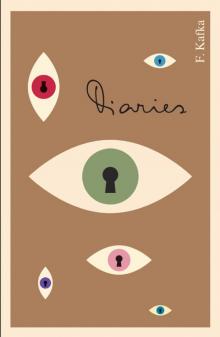 Diaries of Franz Kafka
Diaries of Franz Kafka Metamorphosis and Other Stories
Metamorphosis and Other Stories The Castle: A New Translation Based on the Restored Text
The Castle: A New Translation Based on the Restored Text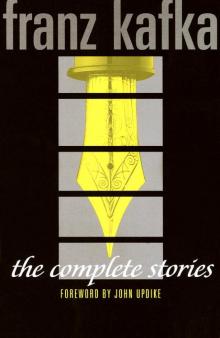 The Complete Stories
The Complete Stories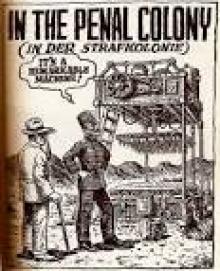 In the Penal Colony
In the Penal Colony The Trial
The Trial Amerika
Amerika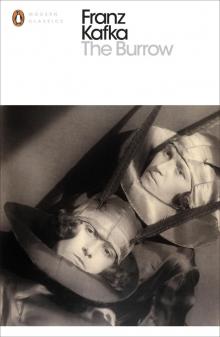 The Burrow: Posthumously Published Short Fiction
The Burrow: Posthumously Published Short Fiction Sons
Sons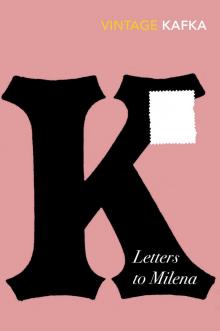 Letters to Milena
Letters to Milena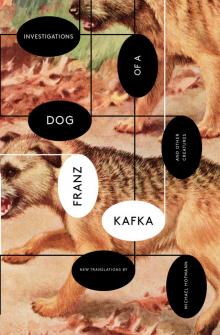 Investigations of a Dog: And Other Creatures
Investigations of a Dog: And Other Creatures Collected Stories
Collected Stories The Great Wall of China
The Great Wall of China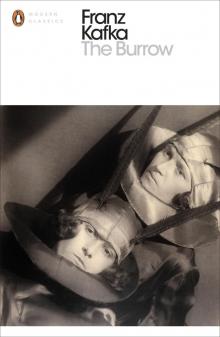 The Burrow
The Burrow The Castle
The Castle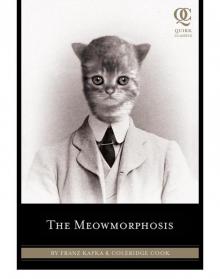 The Meowmorphosis
The Meowmorphosis The Sons
The Sons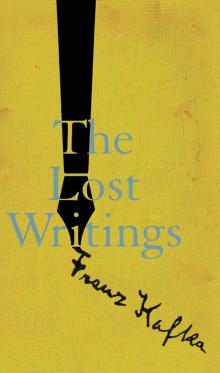 The Lost Writings
The Lost Writings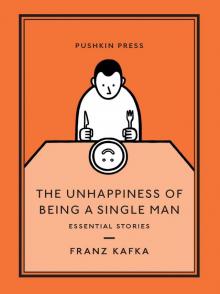 The Unhappiness of Being a Single Man
The Unhappiness of Being a Single Man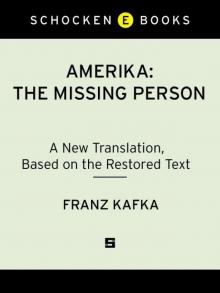 Amerika: The Missing Person: A New Translation, Based on the Restored Text
Amerika: The Missing Person: A New Translation, Based on the Restored Text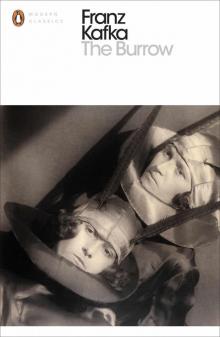 The Burrow: Posthumously Published Short Fiction (Penguin Modern Classics)
The Burrow: Posthumously Published Short Fiction (Penguin Modern Classics)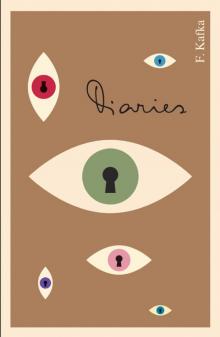 The Diaries of Franz Kafka
The Diaries of Franz Kafka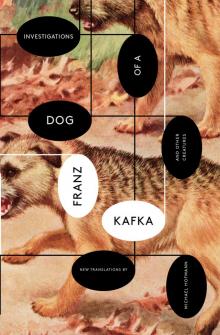 Investigations of a Dog
Investigations of a Dog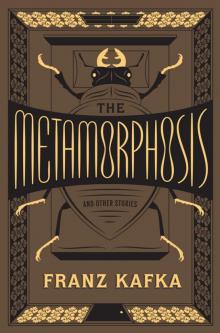 The Metamorphosis and Other Stories
The Metamorphosis and Other Stories The Trial: A New Translation Based on the Restored Text
The Trial: A New Translation Based on the Restored Text